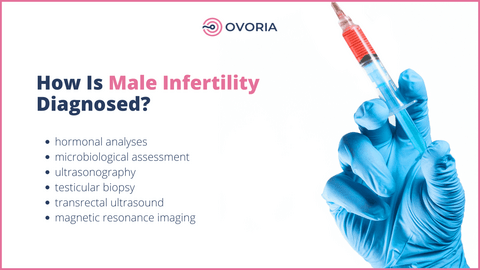Male Infertility and IVF
In Vitro Fertilization is an effective treatment for male infertility. This type of assisted reproductive techniques was developed from a discovery that relatively few sperm are needed to achieve fertilization when the eggs are removed and used outside of the body, which led doctors to create better ways for IVF treatment to be applied as a form of therapy for male fertility problems. Nowadays, ART (Assisted Reproductive Technology) has become incredibly popular because this type of assisted reproductive technology helps alleviate many kinds of female factor infertility-related issues, including endometriosis and uterine fibroids - conditions where pregnancy would not naturally occur without medical assistance. However, IVF treatment only treats cases involving low levels of motile sperms or no viable ones at all.


What Are the Symptoms of Male Infertility?
The main symptom of male infertility is the inability to help his wife to conceive. However, there are some other signs of male infertility, which can include:
- Issues with reduced sex drive, difficulty ejaculating or erection;
- Low sperm count;
- Abnormal breast growth (gynecomastia);
- Reduces muscle mass;
- hormonal abnormality;
- Pain in the testicle area.
How Is Male Infertility Diagnosed?
Male infertility is a complex diagnosis and treatment process. It should be carefully examined by medical professionals to accurately diagnose the problem while also identifying appropriate treatments that have been proven effective for male fertility issues. Some standard methods of investigation include:
- Hormonal analyses: it involves assessing hormone levels to determine which are contributing factors or not;
- Microbiological assessment: this helps identify bacterial infections as well as other possible sources such as STDs (sexually transmitted diseases);
- Ultrasonography: used for both males and female patients with reproductive health problems, it's an imaging technique using high-frequency sound waves reflected off internal organs to create images on screens so doctors can observe them more closely;
- Testicular biopsy: it's a surgical procedure where tissue samples will be taken;
- Transrectal ultrasound (TRUS): With the help of the transrectal ultrasound, it will enable high-resolution imaging of the prostate, seminal vesicles, and vas deferens. It diagnoses any acquired and congenital abnormalities that cause obstructive azoospermia.
- Magnetic resonance imaging (MRI):
Imaging plays a role in identifying potentially correctible causes of infertility in men. It helps identify the congenital anomalies as well as the disorders that obstruct sperm transport.
What Are Causes of Male Infertility?
All the steps must be undergone to get pregnant, ideally from ovulation to fertilization and successfully implanting a baby into uterine walls. Any single abnormality or disorder can make it difficult for couples trying to get pregnant. Some major medical causes are:
- Male accessory gland infections (MAGI): Inflammation or infection in the male genital tract can impact a person's ability to procreate.
- Endocrine disturbances: an endocrine system is a group of glands that control the production of certain hormones. When these hormones are out of balance, infertility can result.
- Genetic abnormalities: Some genetic changes can cause abnormal sperm production or blockage of sperm flow, which in turn can cause male infertility. The most common congenital abnormalities are chromosomal conditions that affect sperm production and other conditions such as Down Syndrome.
- Immunological factors: Diagnosing the problem is not always easy. An infection or injury can sometimes cause a condition in which the body attacks healthy sperm. This hinders the sperm's ability to reach the uterus and penetrate an egg.
- Sperm morphology: The shape of sperm is an essential factor in determining the likelihood of a pregnancy. At least 4% of the sperm should be shaped typically to have a chance of fertility.
- Sperm motility: If you're trying to conceive, knowing about sperm motility can give you an indication of whether or not you're likely to become pregnant.
- Primary testicular disease: Oligozoospermia and azoospermia are associated with Primary Testicular Disease, which is the major cause of infertility in men.
- Varicocele: It is a disorder of the veins in the scrotum, which causes insufficient blood flow and affects sperm production. It's one of the leading causes of male infertility and is found in almost 40% of infertile men.
- Increased scrotal temperature: The temperature of the testes should be 2-4 degrees below body temperature. Increased temperatures negatively affect sperm function and sperm concentration, leading to infertility.
- Sperm disorders;
- Hormonal imbalances.
Fertility Treatments for Males
Several infertility treatment options are depending upon the diagnosed reasons behind male infertility. Some practical options include:
- IUI also known as Intrauterine Insemination. It is a process in which sperm is injected inside the woman's uterus using a catheter. It reduces the travel time of sperm, making it easier for sperm to fertilize.
- IVF treatment is a process in which fertilization takes place outside the body. Both sperm and ovum are separately collected and fused in a test tube, and once the embryo formation takes place, it is transferred from the woman's uterus to the implant.
- Intracytoplasmic sperm injection (ICSI) is the process of choosing the best sperm and injecting it into the cytoplasm of the ovum. This increases the success rate in case of male infertility.
- In Vitro Fertilization with donor sperm is a treatment for couples with uncurable male infertility factors or hereditary diseases. Sperm is taken from a male donor after consultation with the team.
- Surgical Sperm Retrieval:
In vasectomy cases, non-obstructive azoospermia, congenital absence of vas deferens, or obstructions of sperm release, surgical sperm retrieval helps retrieve quality sperm for successful infertility treatment.
Common Reasons for Infertility in Men
A man's inability to impregnate his wife can result from irregular lifestyle and environmental factors such as an absence of sexual intercourse, smoking and drug abuse, childhood surgery, or prolonged stress. Other causes may include the use of condoms, which interfere with sperm motility, and lubricants that change pH levels in vaginal fluids preventing conception from taking place. A lack of knowledge about ovulation time prevents pregnancy from occurring if not matched correctly by timing sex during days when possible fertilization is most likely. Working long hours in hot weather or a chemical factory exposes one to a higher risk for exposure to various chemicals, which could cause fertility issues.
Conclusions
Infertility is today significantly higher than decades ago because of health issues like obesity, the spread of sexually transmitted diseases, and people putting off having kids. Out of all the causes of infertility, male infertility accounts for about 40%-50%. In-vitro fertilization treatment is considered to be the most appropriate technique for certain types of male infertility. The success rate of fertility treatment with male factor infertility depends upon several factors.
References:

